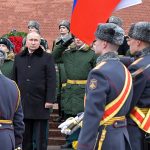
Josh Marshall

POINT: CNN is now reporting that Justice Roberts planned to dissent from Alito’s majority opinion. He was willing to affirm the 15 week Mississippi law but not overturn Roe in its entirety. That sounds fairly Roberts-like in a way, though it’s notable to me that a Chief Justice would want to be on the dissenting side of perhaps the most historic decision of his tenure when he must have at most equivocal feelings about overturning Roe. In any case, the rapidity with which Roberts’ apparent decision was reported out makes me wonder whether the breakdown in secrecy with this case doesn’t go beyond the leak of Alito’s draft majority decision. Don’t know precisely what this would mean. But keep that in mind. That’s real fast.
Read MorePolitico just published what it says is an early draft of a majority opinion in which the Court formally overrules Roe v Wade. The reporting suggests that all the Republican-appointed Justices other than Roberts are supporting the opinion and the decision. Alito is the author of the opinion. It’s not clear whether Roberts may support the decision, will write a concurring opinion or won’t support the decision at all. It’s sobering, shocking to see the words, “We hold that Roe and Casey must be overruled,” which the opinion reportedly contains. And yet, really it’s not surprising at all. This has been an open secret for months. Indeed it was inevitable the moment Amy Coney Barrett joined the Court. Still, seeing it … In a different way what’s more surprising is that a draft opinion leaked. As far as I know that’s totally unprecedented. Certainly I don’t think it’s ever happened in a high profile case. And here we are.
Read More
In response to a reading recommendation over the weekend I heard from a number of readers who said something along these lines: we’re not the ones escalating. Putin and Russia began this, did all the escalating. Many of these responses came down to this: Putin and Russia are completely in the wrong here. All the escalation is coming from one side.
Read MoreThis thread by Ian Kearns is the best I’ve seen so far capturing the totality of the situation in the Russo-Ukraine War and what we can and can’t do about it. It is an extremely dangerous crisis because both sides now have themselves committed to what they see as commitments and needs they cannot walk away from. He does a good job in my mind of making clear the need for both firmness/resolve and restraint and — since that’s easy enough to agree with and say in the abstract — just what those mean in this context.
I think that on balance the U.S. is making the correct decisions with respect to the Ukraine War and I disagree with the thrust of the arguments in this piece by Michael Hirsch in Foreign Policy. Russia’s actions are likely a better measure of their intentions than their words. But it’s a close run thing and I recommend the article to you. The gist of the argument is that the U.S. is creating a situation with no obvious end game, no off-ramps. We’re pursuing a policy the end of which is complete defeat for Russia in Ukraine rather than a political settlement. We’re stating explicitly a policy of weakening Russian military power and influence around the globe. That comes with real dangers and we should understand them, even if the risks are necessary.
 The Blueprint for Stealing the 2024 Election
The Blueprint for Stealing the 2024 Election 
I wanted to flag your attention to a relatively little seen op-ed by a former federal judge named J. Michael Luttig. The title of the piece: “The Republican blueprint to steal the 2024 election.” Pretty red meat, right? His focus is something we’ve talked about before, the so-called “Independent State Legislature” doctrine. This is the idea — a truly absurd and tendentious reading of the constitution — that holds that state legislatures are the arbiters of the conduct and also the results of federal elections, entirely independent and above the laws of the given state and even the state’s constitution. But before we get into that, let’s get back to Luttig himself who I’ve rather breezily described as a “former federal judge.”
Read More
From TPM Reader PT …
Read MoreI think what’s been really puzzling about the Z War this last week or so is the disconnect between Russia’s propaganda / rhetoric and its actions.
 A Few More Thoughts on Russia Escalation
A Few More Thoughts on Russia Escalation 
Let me share a few further thoughts on the current situation in Ukraine, the progress of the Ukraine-Russia war and the chances for further escalation and/or expansion of the conflict. No one knows what’s coming next or how Russia might respond to its escalating mix of battlefield reverses and national humiliations. Without any specialized knowledge in the area I’m especially in the dark. So I rely on the opinion of people who I believe are knowledgeable and have good judgment. For me, in this area, one of those is Tom Nichols. (He’s a defense academic specializing in Russia/Soviet Union and nuclear deterrence policy.) In this thread last night he made clear he’s very concerned about the present situation and what is behind or what is signaled by the escalating rhetoric emanating from Moscow. Maybe not panic level, but very concerned. The salient point from him though is that the decisions about some erratic escalatory actions are going to be made in Moscow and there aren’t a lot levers we have to affect it. That’s a very sobering conclusion.
Read More
Here’s an interesting and thought provoking Twitter thread by a Rand Corporation political scientist, Mike Mazarr, on the chances of a major Russian escalation in Ukraine. It touches on some points I noted yesterday about the dangers of Russian weakness and military failure. (It builds in part off this piece from a British national security think tank, “Operation Z: The Death Throes of an Imperial Delusion.”) On the ground in Ukraine it looks like Russia has failed miserably at its initial war aims and strategies and is now trying to grind out much more limited ambitions in the east. But within Russia and in Russian media rhetoric has escalated to make Ukraine itself almost a side issue. They portray Russia as in an existential struggle or holy war, a war that is really against NATO and the U.S. “Russian television has been flooded with statements urging escalation as part of an existential struggle.” A top legislative leader says: “This is a metaphysical clash between the forces of good and evil… This is truly a holy war we’re waging and we must win.”
Crazy stuff.
Read More On The Elon Musk Razzmatazz
On The Elon Musk Razzmatazz 
I was disappointed to see Elon Musk purchase Twitter. On most of the big questions and conflicts in the world today, he’s on the wrong side. It would probably be better for me if Twitter did not exist. But it does. I have what can only fairly be described as an addiction to it. In any case, it would remain a professional obligation to use Twitter even if I didn’t — it’s how I help distribute what we publish at TPM. The best prediction I’ve seen about what is likely Twitter’s future is neither the optimistic nor the extreme pessimistic views but rather that it will be mostly the same but go back to the less governed model of half a dozen years ago in which there was more harassment, neo-Nazis and government-backed disinformation campaigns. The simple truth is that content moderation is much, much less about “free speech” or unpopular opinions than some random guy DMing pictures of his penis every day for a year to a woman he’s harassing, or hoaxes about people dying, or copyright infringement. Of course, as Musk knows as well as anyone, Twitter is also a great tool for market manipulation and securities fraud. In other words, it’s less about “speech” than the digital amplification of the predatory dimensions of people’s personality disorders.
Here is what caught my eye this morning.
Read More